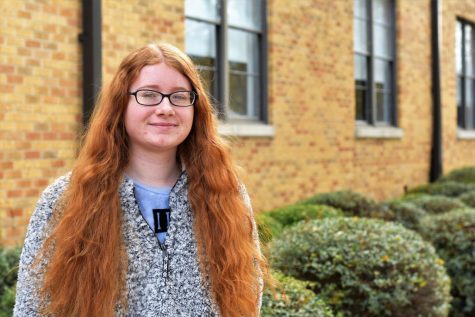The Heart of a Volunteer

Sta-Home organizes Hospice volunteering for the comfort and company of their patients.
Hospice volunteer workers will experience heartbreak and lose their newfound friends,
but they will gain so much more than that.
The highlight of our lives are the friends we meet, and the love we share, whether that be
with our partners, our children, or life long friends. But in this busy time period we live in, aging
can be a sentence of lonely isolation for our elderly.
Retirement homes are often full of tired, confused, and abandoned faces. Their spouses
have long passed, and children have their own families to care for, leaving these experienced
people to whither away with all the wisdom they could have offered.
Compassion has not left everyone, though. Volunteers visit as often as they can, out of
sheer love and altruism.
“We read them books, we sing them songs, and we make their day a little better, whether
you can see it in their eyes or not,” Mrs. Sanders, a retired Hospice volunteer said. During my
time with her, she reflected on a great deal of her experiences long forgotten in the nursing home
she visited.
She remembered the glaze of their eyes, shielding them from the poor environment
around them. Sometimes, it seemed like they did not really know she was there. They just lie
there and stare into the distance, and she always wondered what they were thinking about, if
anything. But the nurses told her how different the patients acted after her company, so she knew
her work mattered.
Mrs. Sanders considered the elderly much like children in their behavior. She knew they
loved attention, and they would act out just so she’d look at them.
“The children of these people have abandoned them,” she said, “and they don’t care to
hear about how their parents are behaving in the home. Nurses sometimes don’t care. They’ve
been on their feet for hours, so when Bob wants to throw his applesauce, she chooses to ignore it.
But me, I go and sit down with them and I look them in the eyes and talk to them.”
She looked down at the tile floors, a memory of one mute veteran passing through her.
She smiled to herself.
He lived on the dementia wing of a veteran home. This wing in particular was guarded by
locked doors that required a code to open them. The patients on this floor often did not know
where they are or how to care for themselves, and so they’re locked in the room, not unlike a
daycare, and cared for all hours of the day. Some of the friskier ones tried to escape. Others were
unconcerned or wheelchair bound.
Mrs. Sanders helped the nurses put breakfast out for the patients. Most of them had to be
hand fed, however, and with short staff, feeding them all was a slow process. The lucky ones get
their food lukewarm. The rest were fussy about it, but they either get their food cold or not at all.
She sat down to feed one of the veterans. He never spoke a word and the nurse had told
her he never ate much. But she sat down beside him with a smile and a high pitched, enthusiastic
voice. She talked to him as she raised the spoon to his mouth, and he would smile at her as he
opened wide and look her right in the eye. When he wanted to stop eating, she would encourage
him. He’d grin at her, happy to have a pretty young lady caring for him again and take another
bite and another until he had finished his plate for the first time in months. She felt a sense of
pride, but it also made her heart ache. Had no one sat down with him and encouraged him to take
care of himself or motivated him to live instead of just getting by? But she saw the warmth in his
eyes after his stomach was full and he had been encouraged and smiled at. She knew it had made
his day, and she felt wonderful for doing so.
But volunteer work was not all rainbows, she explained. She looked down at the floor yet
again, solemnly. This was the one that really broke her, but made her go out and put more effort
into her patients.
“The goal for Hospice patients isn’t trying to find a cure or treating an illness or trying to
stop Father Time for another year and another. It’s just to give someone a quality of life while
they live out their very last days. You never know when they’re going to pass,” she explains.
“You could be assigned a patient and never even get to take the trip to see them before they pass.
Or you might see them for a week, but rarely more than a month. You usually don’t have time to
get attached to them, but there was this one man that I was assigned…I’ll never forget him.”
At this point, she hadn’t been volunteering long. She had only received close to five
patients assigned to visit so far, and they had all passed after the first or second visit. None of
them really spoke or acknowledged her presence. A couple talked to themselves while she sat
with them and held their hands and tried to engage in conversation with them.
But, Mr. H we’ll call him, was different.
He sang to her every time she came to his bed or his chair. He would slowly turn his
head to look at her and just start singing in a shaky but moving voice. Or he would talk to her
and ask questions, even if some of them weren’t coherent.
She’d brought him a card and a little plastic flower the first time she had come to see
him, and he absolutely loved it. He thanked her over and over again, and then he went into detail
about his war stories and his family and his children, who he hadn’t seen in ages. He loved for
her to read him the newspaper to him, but he described the pain he felt when another of his
friends was described in the obituaries. He’d get quiet then and listen to her read from the books
or articles she brought.
It was his songs that often brought her to tears, though. His voice was so shaky, but he
was bound to finish his cadences before he would get quiet again. It was a precious sight to see
for her. Sometimes, although she couldn’t remember their words, the rhythm of them would get
stuck in her mind.
She realized quickly in her volunteer work that he was very active for a person who was
wheelchair and bed bound. Emotionally, that is. He was different from all the others she had
volunteered for.
A blush formed on her cheeks. “I’m a little ashamed to say, I came and visited him more
often than others I had looked after.”
She loved to hear his stories, to hear about his family and his love life and soak in all of
the wisdom he had to offer. It went on for months. She watched him deteriorate slowly, from
being able to hold the card she gave him open by himself, to shaking so much that he could
barely scratch his head without hurting himself. She knew what was coming, but she held on
because she liked his company.
“I hope I was the reason he held on so long.”
Mrs. Sander’s asked me to leave the room while she thought about all of this. She didn’t
like crying in front of others. I sat back down in the rolling chair when I came back and she’d
wiped all of her tears away, but clearly not her vivid memories.
“I wasn’t expecting it when he passed on his birthday,” she started.
She had spent 3 days painting him a canvas of the American flag and a bald eagle as a
gift. She showed up to the veterans home with a smile, but the nurses stopped her before she
entered his room. They told her of his poor condition, and although they did not stop her, they
warned her about continuing inside.
“I didn’t want to go in there and see, but I did, and it still haunts me to this day.”
His skin had turned such a dark color, and he held his arms up in the air awkwardly,
stiffly, shaking them. He was mumbling incoherent words and babbling. She tried to speak to
him softly, but just most of her other patients, she was no longer acknowledged. She had been drowned out as he saw his life flashing before his eyes. She had to step out of the room, but his
image followed her.
She was hard on herself, even now. “Like a coward, I left with my painting. I couldn’t
bear to see him or wait until it was over. I had to get out of there. I had to be alone.”
She got the text that night saying that Mr. H had passed, followed by the new name of
her next patient. She was devastated, but it motivated her to help her next patient even more. She
says she will never forget him, though, and who could?
“I hope that I made his last few months better. Sometimes I still think of the way he last
looked and that frightens me, but that’s a sacrifice I would have made over and over again, if it
meant making his life a little less lonely.”
She told me how his family never even showed up during his final hours, despite living in
that same city as the nursing home. Only her and the nurses who cared for him day and night saw
his condition.
After all of this, I know there’s not a pay grade that any true volunteer would accept in
return for mere hours of their time. They make more sacrifices than expected of themselves to
keep the elderly from leaving this world alone. They give people the chance to experience one
final friendship, the chance to be read one more story from their favorite book, and one more
news article. And most importantly, the heart of the volunteer is the final diary that some of these
veterans write their most profound memories in for the last time.

Abby is a 20-year-old junior transfer student from Ethel, Miss. Abby loves writing, drawing, riding horses and playing with her three-legged dog, Gracie,...


